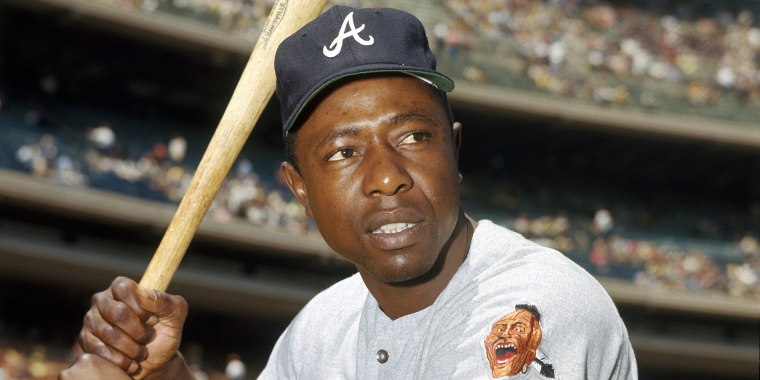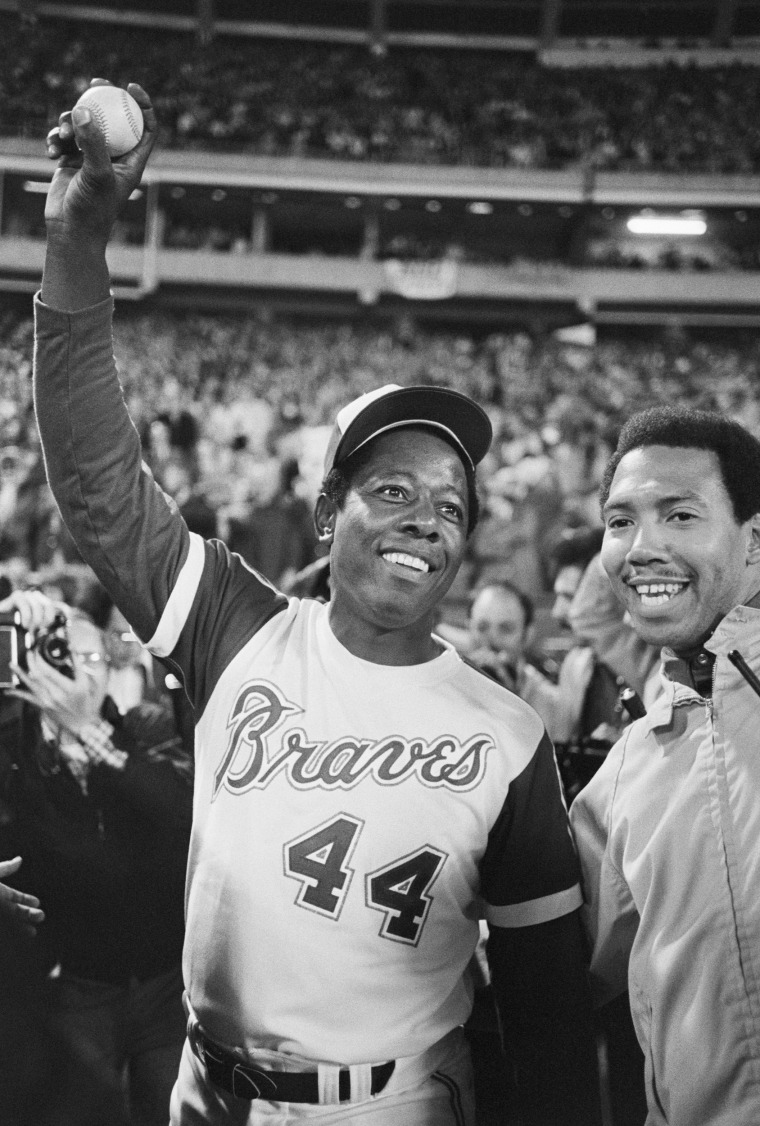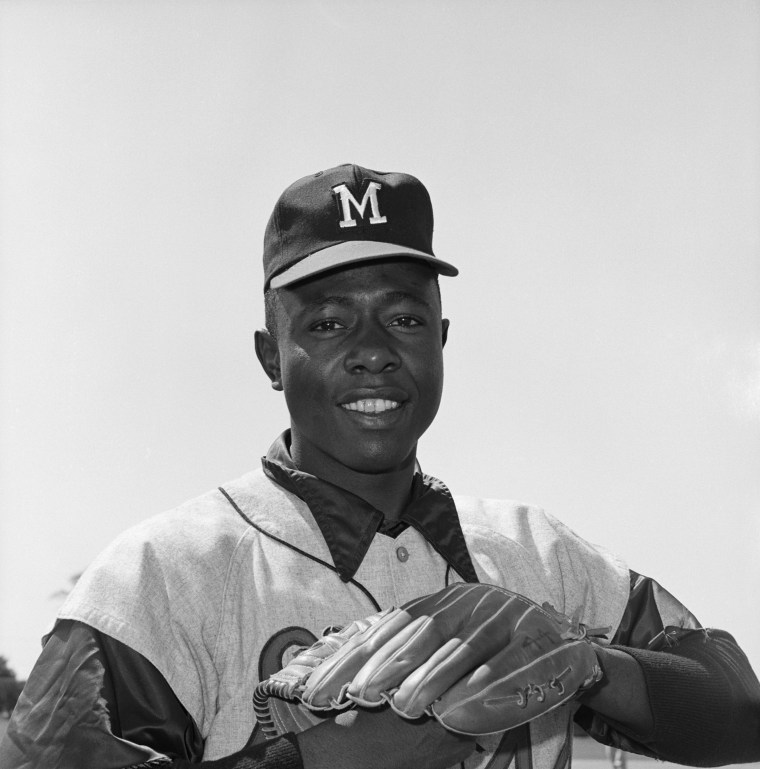Hank Aaron has a compelling argument as the greatest baseball player who ever lived, but how did the baseball immortal see himself in that conversation?
Aaron, who died at 86 on Friday, spoke with TODAY's Craig Melvin last February about how he wanted to be remembered.
Watch TODAY All Day! Get the best news, information and inspiration from TODAY, all day long.

"I've been fortunate and lucky in some ways," he said. "I would just like to be remembered as someone that God gave him the talent to play this game, and he did everything humanly possible to make the game the way it's supposed to be played."
The Hall of Famer finished his 23 seasons with the Milwaukee/Atlanta Braves and Milwaukee Brewers with 755 home runs, which stood as the Major League Baseball record for 33 years, and he ranks first in MLB history in runs batted in (2,297), extra base hits (1,477) and total bases (6,856) and in the top five in career hits (3,771) and runs scored (2,174). His 15 seasons of at least 30 home runs are also a record (shared with Alex Rodriguez).
"We are devastated by the passing of Hammerin’ Hank Aaron, one of the greatest players and people in the history of our game," MLB tweeted on Friday.
"Was an honor of a lifetime to sit down with Hank Aaron roughly a year ago," Craig tweeted Friday. "He died peacefully in his sleep. He was so much more than a baseball player."
Given his incredible career numbers and accolades, which included 25 All-Star selections, Craig told him last year there is a strong case that Aaron is the greatest player of all time.
"Well, I'm with you," Aaron said before laughing.
Aaron was also one of the wave of Black stars to follow the legendary Jackie Robinson after the Brooklyn Dodgers star became the first Black player to break the color barrier in MLB in 1947.
Aaron began his career as a shortstop in the Negro Leagues for the Indianapolis Clowns in 1952 before eventually joining the Braves organization only a few months later and making the transition to MLB.

The Negro Leagues celebrated their 100th anniversary last year. MLB announced in December that it was conferring status of the Negro Leagues to that of a major league, meaning that the statistics from Black baseball teams will become part of the official MLB records.
"If it had not been for the Negro Leagues, you wouldn't have had as many Black baseball players as you have now," Aaron said. "To play in that league and to play with the ballplayers that I played with gave me an opportunity to do some things that I wanted to do."
Aaron came from humble beginnings when he began his career with the Clowns.
"I remember so well my first year that I left Mobile, Alabama — one little coat, 2 dollars and a half in my pocket, and my mother told me that was all she had to give me, and be very careful with it," Aaron told Craig.
Aaron also had some eerie connections to Robinson later in his career, as Aaron's No. 44 jersey was retired by the Braves exactly 30 years to the day of Robinson breaking the color barrier in his first game with the Dodgers, according to MLB.com.
Aaron's historic 715th home run in 1974 to pass Babe Ruth as baseball's all-time home run king also came exactly 25 years to the day that Robinson and teammate Roy Campanella made history as the first Black players to play in an integrated professional game in the Deep South in a game in Atlanta.
His home run record was broken in 2007 by Barry Bonds, who finished his career with 762, but many baseball fans still consider Aaron the home run king because Bonds achieved his feat under a cloud of suspected steroid use.

"It's kind of hard for me to digest and come to realize Barry cheated in the home runs, cheated in this and that," Aaron told Craig.
During his short time in the Negro Leagues, Aaron faced racist restrictions like no Black players allowed in dining rooms, gas stations that closed their restrooms to Black players and white-owned hotels that would not allow players to stay there.
He also faced discrimination as one of the few Black players in MLB when he started with the Braves.
"It was tough, no question about it," he said.
The racism he faced came into harsh focus in the months leading up to his historic 715th home run, as he faced thousands of death threats while approaching Ruth's long-standing career record.
"I couldn't go out of the ballpark without an escort," he said. "I had to stay in another hotel rather than stay in the hotel with my teammates. It was the toughest moment of my life."
Aaron persevered to smack the record-setting home run off Dodgers pitcher Al Downing and earn a standing ovation from the crowd at Atlanta-Fulton County Stadium.
"When he hit that home run, we knew how great it was, but we also knew about the racism," Al Roker, who grew up watching Aaron, said on TODAY last year. "It was an unbelievable moment for so many reasons."
The Hall of Famer was still working as a senior vice president for the Atlanta Braves in the final year of his life, and he continued to be a strong advocate for programs to get more young Black athletes to play baseball.
New York Mets pitcher Marcus Stroman, who is Black, was one of numerous players to remember Aaron on Friday.
"RIP Henry Louis 'Hank' Aaron!" he tweeted. "Sad sad day. Thankful for your heroism!"